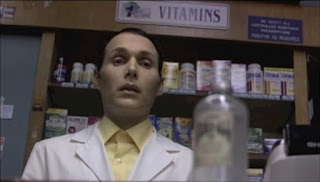Duck Soup (Leo McCarey, 1933, USA)
Duck Soup, the Marx Brothers’ fifth film together and their last with Paramount, was met with a mixed reception on its release. While the film was not a terrible failure, it did not meet the expectations of Paramount, and the Marx Brothers would leave that studio and join forces with MGM for their next feature. Perhaps the Brothers’ off-brand of anything-goes zaniness did not strike a chord with a Depression-stricken 1933 audience. Nevertheless, Duck Soup remains the most enduring Marx Brothers film precisely because of this zaniness. The film is a pure showcase for their trademark brand of humor.
What little Duck Soup features in the
way of plot involves two fictional nations – Freedonia and Sylvania. Mrs.
Teasdale, played by the Marx Brothers’ favorite straight woman Margaret Dumont,
is a wealthy aristocrat who demands that Rufus T. Firefly (Groucho) become the
leader of Freedonia. Meanwhile, Sylvania is trying to annex Freedonia with the
help of spies played by Harpo and Chico. The film descends ultimately descends
into warfare. While there are clear targets for satire here, including the
rising specter of fascism in Europe, Duck Soup is not a calculated
political satire in the manner of Chaplin’s Great Dictator. It is far
more a vehicle for the Marx Brothers to unleash anarchy.
The Brothers
are at the top of their game here, with Groucho unleashing endless one liners,
Chico yapping a mile-a-minute, and Harpo unleashing his malicious physical
humor. The Marx Brothers’ origins in vaudeville are on display, with some
iconic scenes derived from the vaudeville theater. The famous mirror routine is
excellent and still holds up to this day. While the musical numbers have aged
less well, overall, the film is a briskly satisfying experience, making an hour
and eight minutes pass by as if in no time. Highly recommended.
10/10



Comments
Post a Comment